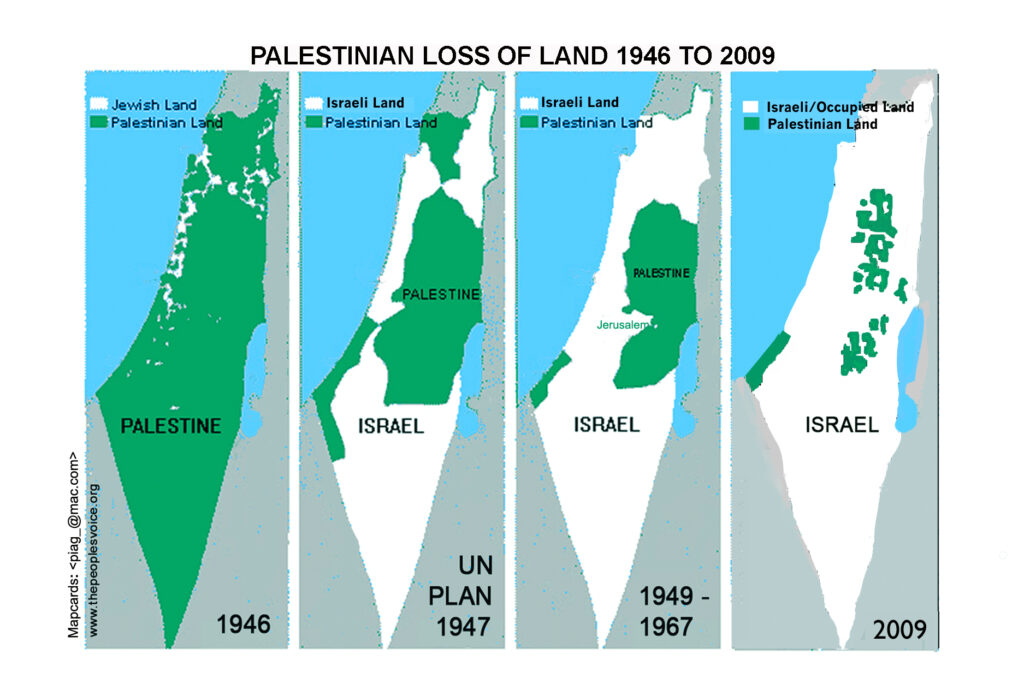
Peer reviewed by Ahmed Al-Shammari
Teacher reviewed by Mitzi deFer & Ashley Haskins
The Israel-Hamas conflict, a fiery subject internationally has once again flared up, causing much concern across the globe. But before diving into the current circumstances, let’s rewind a bit for some context. The tension between Israel and Palestine has roots stretching back over a century. During WWI, the region was part of the Ottoman Empire which had spanned 400 years. The British promised independence to the Arabs if they revolted against the Ottoman Empire, but they failed to do so once the war was over. When the Ottomans collapsed, Britain took the region as a colony, denying Arab independence while supporting Jewish immigration into the region.
In 1947, with the support of the United States, the United Nations adopted Resolution 181, also known as the Partition Resolution. Palestine was to be divided into Jewish and Arab states in May 1948. Palestinian Arabs did not recognize the agreement, and when Israel declared its independence, some Palestinians attacked Jewish settlements in an attempt to halt settlements. As the first violent conflict in Israel’s history escalated, armies from Lebanon, Syria, Iraq, Saudi Arabia, and Egypt joined the Palestinian cause. British-trained forces for Israel eventually regained control, and took possession not only of the original area the UN had proposed for the state of Israel but also a majority of the area proposed for the Arab state. This conflict is now one of the longest-running conflicts in the world. Hamas, a Palestinian militant group and terrorist organization, has been at the forefront of the fight against Israel, seeking to end Israeli occupation and establish a Palestinian state. Hamas was originally founded in 1987 and was voted into power in 2006 and there has not been a vote since.

Fast forward to October 7th, 2023, when the battle drums roared anew. In the early hours, Hamas unleashed rockets into various areas of Israel, setting off alarms even in far-off cities like Tel Aviv. Israel, not one to sit on its hands, retaliated with a storm of thousands of bombs and rockets on the Gaza Strip. Marc Garlasco, a military adviser at the Dutch organization PAX for Peace, shedded some light on the gravity of the situation. As reported by The Washington Post, Garlasco noted that Israel is “dropping in less than a week what the US was dropping in Afghanistan in a year…” (Rubin). This alarming comparison highlights the ferocity of the conflict and the perilous circumstances the people of Gaza are in The densely populated area provides no room for error. This retaliation was not on the Hamas terrorist group itself, but on the innocent Palestinians, whose land is controlled by Israel. Israel has suffered over 1,500 total casualties since the escalation, while Gaza has suffered over 2,000 casualties just among its children (AJLabs).
The repercussions echo far beyond the borders of Israel and Gaza with the United States being allied with Israel. Our President, Joe Biden jetted off to Israel to grapple with the unfolding crisis and extend a hand of support to Israel while also pushing Israeli Prime Minister Benjamin Netanyahu not to be “consumed by rage” (Neuman). His visit came amid a wave of protests as people took to the streets worldwide to voice their anguish over the hospital attack and the ongoing violence. In response to heightened tensions, the US State Department issued a worldwide travel alert for all Americans overseas “to exercise increased caution” due to “increased tensions in various locations around the world, the potential for terrorist attacks, [and] demonstrations or violent actions against U.S. citizens and interests.” (U.S. Department)
While we should understand there are brutal atrocities on both sides of this war, it is important to understand why the Palestinians are so outraged. They are treated like second-class citizens. Though part of the state of Israel, Palestinians can’t vote, do not have freedom of movement, and the Israeli state does not give equal access to resources between Jews and Palestinians. As high school students, we may feel detached from the swarm of news and tragedy we are hearing across the globe. However, the human cost of this conflict should be sparking our shared humanity. San Juan High School Student, Ahmed Al-Shammari said, “We need to understand this reaches to every part of the world. Many students who are Arab in America have been killed. There are also many Jewish people who have nothing to do with the conflict that have been affected.” Al-Shammari also hinted at a bigger war saying, “[it is] sucking everyone in, Russia, Iran, and China are opposing Israel and have even taken action.” The United States, however, has been very cautious to show any support to Palestine. We must ask the question: Is the United States on the wrong side of history?







